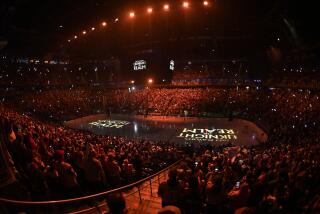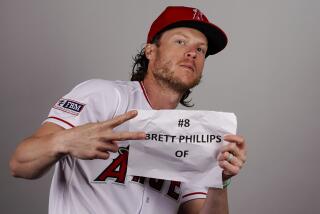Golden Jet II Is an Original : Hockey: Goal-a-game scorer Brett Hull draws comparisons with his famous dad but is his own man.
- Share via
MONTREAL — Jerome MacLean brought his family -- and his boss’s family -- from Ottawa to the Dorval Airport Hilton here the other day to visit his brother Paul, a right winger for the St. Louis Blues.
But when all the children assembled for a picture in the lobby, Paul MacLean was not the focus of attention. The kids let MacLean in the picture, pushed to the back row, but another Blues right winger -- who had been visiting with his own relatives a few feet away -- was front and center:
Brett Hull.
Did you know Brett’s father also played hockey, young Zachary MacLean was asked. “No,” he replied, adding that his uncle Paul was still his favorite player. Jerome MacLean laughed and said, “He doesn’t, but I do.”
Brett Hull laughed too when the conversation was replayed for him a bit later. For so many years it has been the other way, so many years of being Bobby Hull’s son, as if Brett might not exist had his fleet-footed father -- The Golden Jet -- not scored 913 goals in a quarter-century of hockey.
But with Brett Hull scoring goals at a pace that only few have matched, the sporting world is realizing now what the younger Hull discovered some years back: He can not only survive, but thrive as his own person. He recognizes there are parallels to his life and that of his father -- the ability to score goals, the way they helped build or rebuild franchises and their status as ambassadors of hockey. And he doesn’t mind.
But, clearly, they are two different people.
“I’ll always be Bobby Hull’s son, but I’m trying to emerge a little myself,” Brett said. “I realized a long time ago who I am. I don’t play hockey for anybody. I play for myself. I’m Brett Hull. Growing up, it was always ‘Bobby Hull’s son, Bobby Hull’s son, Bobby Hull’s son.’ But you learn you can’t live on someone’s coattails.”
Hull, who in a few hours would skate against the Montreal Canadiens, was wearing black pants and a black sport coat, but the blond hair that reaches his shoulders, the blue eyes and radiant smile overwhelmed the dark outfit.
Hull had 72 goals last season, the most of any right wing in NHL history, and then he signed a $7.1 million contract that helped shake the salary structure of the league. This season, the Blues have played 45 games, the same number of goals Hull has scored.
Only four men have scored 50 goals within 50 games and none is named Hull. Montreal’s Maurice Richard was the first, getting 50 in 50 when there were only 50 games in a season. Mike Bossy and Mario Lemieux have turned the trick. Wayne Gretzky has done it three times, but he needed only 39, 42 and 49 games.
Bobby Hull was feared for the booming slap shot he unleashed after a rush up the ice. His son, the Golden Brett, will take fewer slap shots. With strong forearms and huge hands, he scores more with snap and wrist shots.
“He has probably the quickest release in hockey,” Blues goalie Curtis Joseph said. “As he’s looking for the pass, he knows where the net is.”
Hull called 1989-90 a “dream season” because the 72 goals were unexpected. He had scored 41 the previous year, a fine total but not the stuff of legend.
“Obviously, I felt pressure,” Hull said of this year’s expectations, “but I was never worried that I wasn’t going to score goals because that’s probably the only thing I do very well. If you have confidence in yourself, the way (coach) Brian Sutter uses me and the quality of people we have here, I was never worried about scoring. I was worried about people expecting me to score 72 goals again. It’s obviously possible to do but ... if I got 50, I certainly didn’t want people to be disappointed in me.”
Growing up as one of Bobby Hull’s four sons (there’s a sister too) was at times exciting and at other times painful. Going to Jets practices with his dad in Winnipeg was a thrill. “He was awesome,” Brett said. “Not only the way he played, but as much the way he carried himself off the ice with fans.”
But when Brett was 11, Bobby and Joanne Hull went through a bitter divorce. Brett moved to British Columbia to live with his mother, who has since remarried. Though Bobby and Brett talk now, for years there was little or no contact. Through those years, Brett learned about not clinging to coattails.
“I think I would have done that on my own anyway,” Hull said. “Nothing good comes out of a divorce, as far as a kid is concerned.”
Hull was not much as a midget player, so none of the top junior teams wanted him, no matter his name. But he hooked on with a Tier II team in British Columbia. He scored 105 goals for Penticton that season (1983-84) and Mike Sertich, head coach at the University of Minnesota-Duluth, saw a few.
“The first impression was that that he could shoot the puck,” Sertich said. “The second was that he had 105 goals. The third was that he needed to get in shape.”
Hull doesn’t disagree. Other coaches would later say the same thing about the 5 foot 11, 200-pounder. “I went there because I needed work on my skating and Mike had a system of practice where you skate, skate and skate,” Hull said. “It wasn’t punishment, but he felt what made great teams was great skating ability. I needed that. I hated it, but I’m lazy so it was good for me.”
Hull stayed just two years before signing with Calgary, but he describes those years as two of the best in his life. Though the team’s success was a factor, Duluth embraced him because he embraced it. “He has a very dynamic personality and he always had time for kids,” Sertich said.
“His mother always said she was glad that we recruited Brett Hull, not Bobby Hull’s son,” Sertich said. “When he was here, he wasn’t Bobby Hull’s son. In Duluth, he was Brett Hull. That’s just the way we treat people.”
Father and son are alike in that they have energized franchises that were once weak. Bobby Hull scored 604 goals for the Chicago Blackhawks, beginning in 1957. But his contract was expiring at the end of the 1971-72 season and owner Bill Wirtz didn’t move quickly enough.
Hull reportedly didn’t court the Jets and was dubious of the new league that would call itself the World Hockey Association. To get them to stop nagging his accountant, Hull told them he’d need $1 million up front, never expecting them to come up with it. They did. Today, from the rafters of the Winnipeg Arena hang three Avco Cup banners, symbolic of WHA titles, an oversized portrait of Queen Elizabeth II and Bobby Hull’s No. 9, the only retired number.
Calgary traded Brett Hull to St. Louis on March 7, 1988, because General Manager Cliff Fletcher thought Rob Ramage and Rick Wamsley would better help the Flames win a Stanley Cup, which they did the following season.
When Hull arrived, the Blues were not starting from scratch, but he has helped a resurgence.
There are reports of a power struggle among Blues investors, related to building a new arena, with chairman Mike Shanahan being kept out of the loop. That is ironic because a few years ago nobody wanted the Blues. In 1983, the team came close to moving to Saskatoon, Saskatchewan, or just dissolving. But those days are a memory.
“Our balance sheet is one of the cleanest in sports,” said Blues President Jack Quinn. “We are playing to 94 percent capacity at a 40 percent increase in price.”
The Blues are averaging 16,914 fans per game this season -- an increase of 1,101 over last season and the most since 1975-76. Despite increases of $4 to $6, season ticket sales rose from 9,800 to 12,500.
But the increased sales didn’t kick in until the Blues re-signed Hull. Asked last February what a team without Hull would be like, Blues defenseman Paul Cavallini told the St. Louis Post-Dispatch, “We’d almost be like the Quebec Nordiques.” They could have had Hull for about $300,000 before the start of last season. But once the 72 goals were in the book, the price eventually went to $7.1 million for three years and an option.
“If we hadn’t signed Brett Hull, the franchise would have been disbanded -- that was the message from our fans,” said General Manager Ron Caron.
Though Hull will tell you he doesn’t put himself the category of Gretzky and Lemieux, his marquee value was demonstrated by the fan balloting for Saturday’s all-star game. Hull drew 432,879 votes. Boston’s Ray Bourque was second with 315,362, and Gretzky had 218,797. And Hull has already done the David Letterman show, the truest test of pop-culture celebrity. Hull didn’t play in the game, however, due to an ankle injury.
“I knew I was becoming a popular player, but to have that happen was a surprise,” Hull said of the all-star voting. “I try to come off with you guys as being humble, but there comes a time when you have to realize you’re a pretty popular guy, a ‘superstar,’ a term I hate. But it opened my eyes. It makes you realize what you have to live up to. There isn’t pressure, but there are people out there who look up to you, like I used to look up to my father.”
Hull said he likes to think he’s helped rebuild the Blues, currently tied for the third-best record in the NHL. But he would also like a Stanley Cup. His father’s name is already on it, having helped the Blackhawks to their only title (1960-61) in the last 50 years.
“It’s like a lot of father-son combinations,” Quinn said. “Until you prove it yourself, you’re still somebody’s son. Three or four years ago, maybe it was Bobby Hull’s kid. But in the last two, three years, he’s developed into ‘Brett Hull, marquee player and, oh, by the way, his father was an outstanding player too.’ ”
More to Read
Go beyond the scoreboard
Get the latest on L.A.'s teams in the daily Sports Report newsletter.
You may occasionally receive promotional content from the Los Angeles Times.






